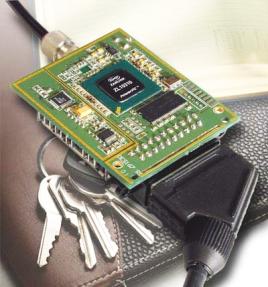STB SOC enables “world’s smallest digital terrestrial STBs”
Nov 27, 2002 — by LinuxDevices Staff — from the LinuxDevices Archive — 11 viewsZarlink Semiconductor (Ottawa, ON) has launched a family of highly integrated system-on-chip processors aimed at the worldwide digital TV set-top box (STB) market. Dubbed “DVB-T On a Chip” processors, the ZL10310 and ZL10311 enable the design of the world's smallest digital terrestrial STBs which comply with Digital Video Broadcasting-Terrestrial (DVB-T) standards, according to Zarlink.
The company claims their ZL10310/311 STB chips are the first to merge all major DVB-T processing functions aside from the RF radio tuner — including terrestrial demodulator, MPEG-2 video/audio, and high-speed processor — onto a single chip. The chips integrate COFDM (coded orthogonal frequency division multiplex) demodulation with a complete STB processing engine, MPEG-2 transport demultiplexer, audio and video decoder, STB peripheral interfaces, and a high-performance IBM PowerPC 405 CPU core.
 To demonstrate the high degree of integration of the new STB chips, as well as to assist companies with evaluation and development, Zarlink has put together a highly compact STB reference design which uses Linux as its embedded operating system. Measuring just 3.5 x 2.2 x 1.0 in., the tiny boardset contains a complete set-top box, including the RF tuner and power regulation. The reference design consumes around 4W of power — roughly 30% less than comparable designs — and complies with the European Code of Conduct on Energy Efficiency, according to Zarlink. A full design database with schematics, bill of materials, layout files, and a comprehensive software development kit for the Linux-based design is available.
To demonstrate the high degree of integration of the new STB chips, as well as to assist companies with evaluation and development, Zarlink has put together a highly compact STB reference design which uses Linux as its embedded operating system. Measuring just 3.5 x 2.2 x 1.0 in., the tiny boardset contains a complete set-top box, including the RF tuner and power regulation. The reference design consumes around 4W of power — roughly 30% less than comparable designs — and complies with the European Code of Conduct on Energy Efficiency, according to Zarlink. A full design database with schematics, bill of materials, layout files, and a comprehensive software development kit for the Linux-based design is available.
Zarlink says they optimized their STB processors for the UK, Europe, and worldwide markets that have adopted the DVB-T standard defined by ETSI (European Telecommunications Standards Institute). Global acceptance of the DVB-T standard, coupled with Europe's decision to switch off analog TV transmissions starting in 2006, and increasing numbers of free-to-air digital channels, will fuel consumer demand for DVB-T electronics products.
'DVB-T On a Chip' family members will eventually span a range of STB apps, from lower cost entry-level STBs, to high-end 'media centers' with built-in hard drives and PVR (personal video recorder) features including multi-channel record and playback, real-time pause/resume, digital sound, and Internet connectivity.
Applications for the devices are expected to include . . .
- Low power, small footprint TV adaptors
- Integrated Digital Televisions (iDTV)
- Digital terrestrial set-top boxes
- DTT / DVD Combo
- DVB-T radio receivers
- Terrestrial / Satellite Combo
- Terrestrial / Cable Combo
- Terrestrial / IP (Internet Protocol) Combo
The following are the key features and specs of the ZL10310 . . .
- DTV-SoC for Digital Terrestrial Television (DTT)
- PowerPC 405 CPU Core with 16k/16k cache, memory manager, and virtual memory system
- On-chip DVB-T COFDM demodulator with FEC
- 6 Video DACs on-chip, for Composite or Component (RGB or Y U/V) Analog Video
- Twin PAL/NTSC DENCs
- Low Power (<1.4W typical)
- Low component count
- Unified SDRAM controller
- I2S Digital Audio Input
- I2S and S/PDIF Digital Audio outputs
- MPEG-2 Audio & Video decoders
- IDE interface
- Inputs for external MPEG-2 Transport Streams
- Conditional Access (CA) DVB-descrambler
- Smart Card Interface
- Infrared & UART interface
- DVB-compatible Common Interface (CI) control and bitstream interfaces
- Multi-stream multiplexing for internal and external demodulators
- External Modem support interface
- Complete Linux-based software development kit (SDK)
The ZL10311 adds Dolby Digital audio decoding and Macrovision Copy Protection capabilities to the above list.
The ZL10310 and ZL10311 are currently in volume production. The devices are packaged in a 388-ball PBGA. The ZL10310 and ZL10311 are priced at $35 and $38 (USD) in quantities of 1,000.
This article was originally published on LinuxDevices.com and has been donated to the open source community by QuinStreet Inc. Please visit LinuxToday.com for up-to-date news and articles about Linux and open source.